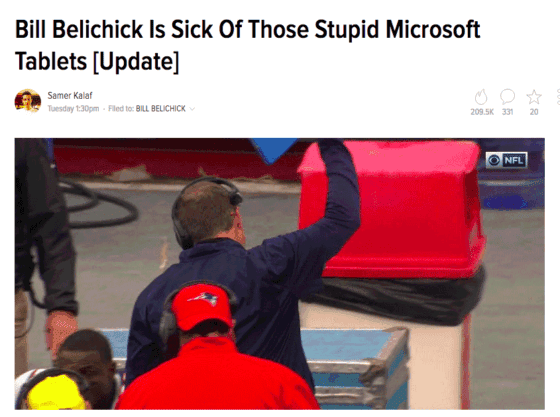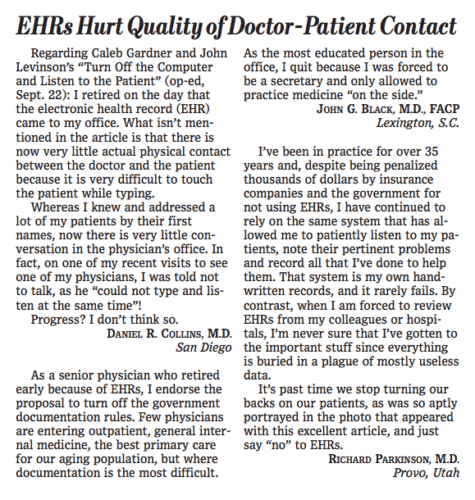I saw this article the other day on Deadspin, one of my favorite non-Lean blogs/sites.
Bill Belichick, head coach of the New England Patriots, got really frustrated with an NFL-provided Microsoft Surface tablet. As with many technology issues, it wasn't the first time he experienced a problem.
If you click through to the Deadspin article, you'll see an animated GIF of Belichick throwing the tablet down in frustration. He says he's not going to use them anymore. Ah, wait, I found a video (but the NFL won't allow embedding):
“Belichick told reporters that the team's IT guy had done all he could, and any issues beyond that were on the NFL. “I don't know how much urgency there is on the other part from the league standpoint,” he said.”
From his press conference comments (also reported on by the New York Times):
“They're just too undependable,” Bill Belichick, the Patriots‘ chronically unimpressed coach, said.
“It's basically a problem every week,” he added.
“I just can't take it anymore,” he said at a news conference Tuesday.
Principle #8 of The Toyota Way management system says:
“Use only reliable, thoroughly-tested technology that serves your people and process.”
Does the use of tablets on NFL sidelines during games pass this test? It sounds like Belichick thinks not. Microsoft has a $400 million deal with the NFL to provide tablets (and people often mistake them for iPads or refer to them that way… or referred to as “knockoff iPads“).
Maybe it's more about money and marketing than effectiveness?
From Deadspin:
“Belichick isn't the only one to complain about the result of the league's multi-year, $400 million deal with Microsoft. As Kevin Clark of The Ringer wrote in August, the NFL's players and coaches have had mixed reactions to the prevalent tablets on the sidelines. Many of them preferred binders to look at plays and formations, since those don't require batteries.”
Belichick also said:
“I'm going to stick with pictures, which several of our other coaches do as well, because there just isn't enough consistency in the performance of the tablets,” he said at a news conference that sounded more like a CNET review.
That's the way it used to be done. Photos (prints of plays and formations would be sent to the sideline.
Would we label Belichick as being “resistant to change?” I wouldn't. He's trying to do his job — and it's a high-stakes job — and he wants tools that help instead of getting in the way.
I posted his full remarks as a comment to this post.
We hear similar things from some doctors about Electronic Medical Record systems and how they are frustrating and slow down their work. It shouldn't be that way. I'd even suggest it doesn't have to be that way.
And, systems might introduce new types of errors even as they solve some.
As the WSJ reported recently:
Medical Record Mix-Ups a Common Problem, Study Finds
The opportunities for the mistakes, which can be deadly, are increasing as health care becomes more complex
From the article:
“A patient in cardiac arrest was mistakenly not resuscitated because clinicians confused him with a patient who had a do-not-resuscitate order on file.
Another patient was given an okay to undergo surgery based on a different patient's records and was found dead in his hospital room the next day.
Such patient-identification mix-ups are common and can have deadly consequences, according to a report from the ECRI Institute, a nonprofit research group that studies patient safety.”
And there was this editorial:
Turn Off the Computer and Listen to the Patient
The practice of medicine is a subtle art. Doctors need to give patients their undivided attention.
I agree with them that avoiding technology altogether isn't the answer:
“The answer isn't to resist technology. Information systems are central to the future of good doctoring, and industry professionals should continue designing electronic systems to enhance medical care and facilitate the connection between patients and physicians. Meanwhile, however, medical practices should be allowed to turn off the “meaningful use” software prompts and return to the job of taking care of real people. Doctors have an obligation to act as stewards of the medical profession and with humanity toward patients and should insist upon the undivided attention necessary to do so.”
The articles prompted letters from MDs who say they don't want to use EMR:
I've heard doctors talk about a health system that advertised “no EMR” as a job perk.
Everybody complains about their EMR, everyplace I go.
What can we do about that? How can we ensure technologies support those who do the work, if they are saving lives or even just doing something as silly as coaching football?
Please scroll down (or click) to post a comment. Connect with me on LinkedIn.
Let’s work together to build a culture of continuous improvement and psychological safety. If you're a leader looking to create lasting change—not just projects—I help organizations:
- Engage people at all levels in sustainable improvement
- Shift from fear of mistakes to learning from them
- Apply Lean thinking in practical, people-centered ways
Interested in coaching or a keynote talk? Let’s start a conversation.












Belichick’s full comments:
It’s aggravating when expensive EMRs don’t deliver. But my experience with healthcare IT more often looks like this: https://youtu.be/g6gG-6Co_v4
[…] “I’ve never been too much of a tablet guy – I kind of know what I see,” Brady said, referring to the team’s tablet PCs (see Mark’s recent post about them). […]